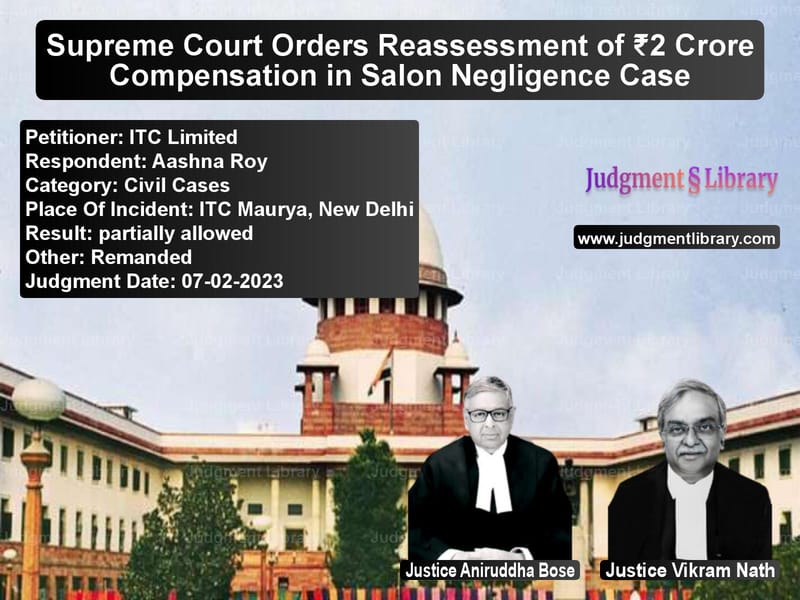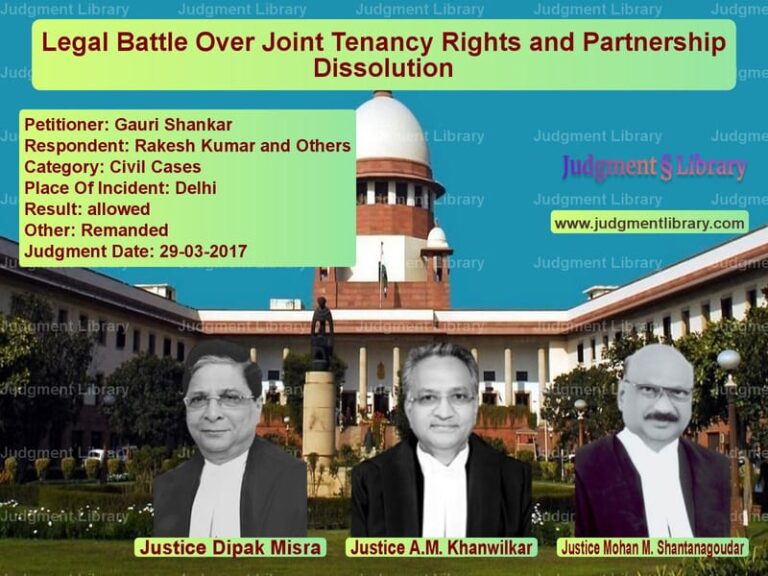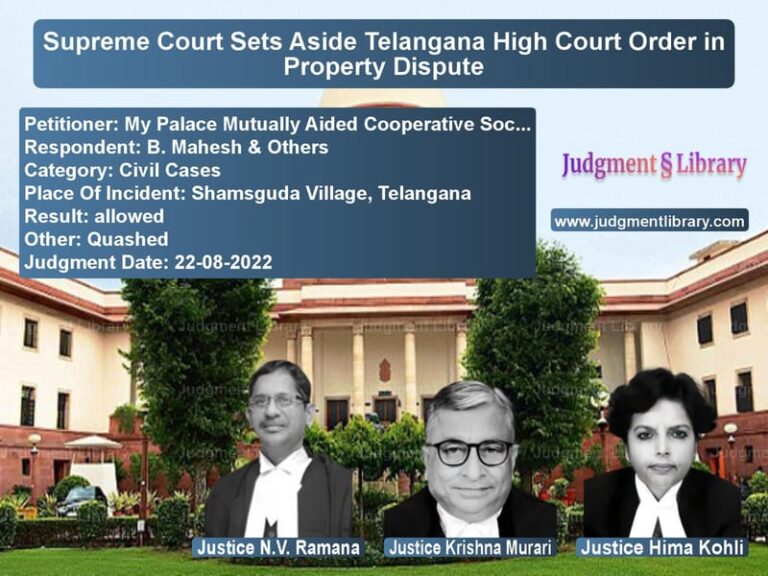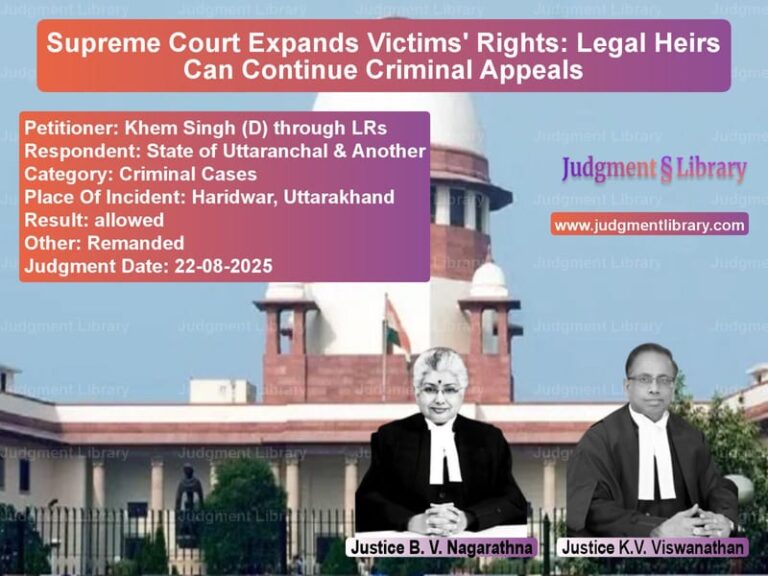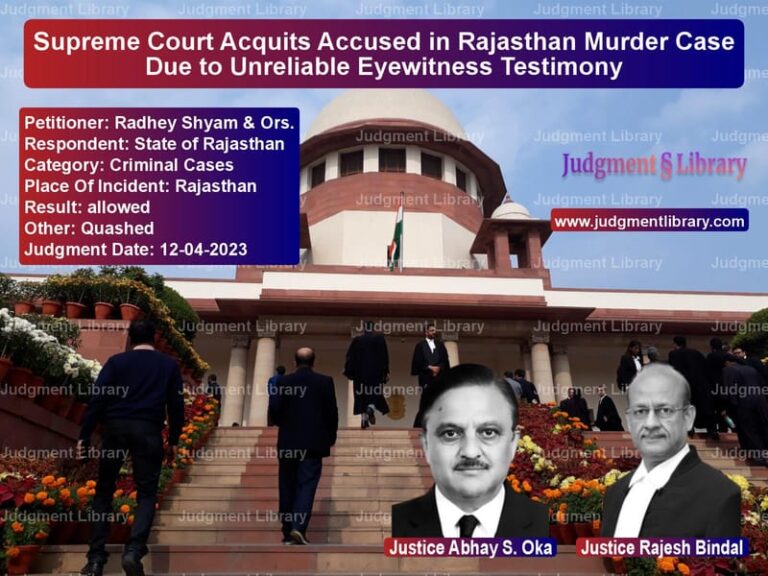Supreme Court Orders Reassessment of ₹2 Crore Compensation in Salon Negligence Case
The Supreme Court of India, in the case of ITC Limited vs. Aashna Roy, addressed a significant consumer dispute involving a claim of deficiency in service at a high-end salon in ITC Maurya, New Delhi. The case centered on a botched haircut and subsequent damage to the complainant’s hair and scalp, which led to severe emotional distress, career implications, and a legal battle over compensation.
Background of the Case
The case originated from an incident on April 12, 2018, when the respondent, Aashna Roy, visited the salon at ITC Maurya for hair styling before an important job interview. She requested a particular hairstylist but was assigned another due to the unavailability of her preferred stylist.
She gave specific instructions for her haircut, asking for long flicks/layers in the front and back, along with a 4-inch trim. However, the hairstylist, instead of following these instructions, cut her hair drastically short, leaving only 4 inches from the top. This unexpected and unwanted haircut caused the respondent severe emotional distress.
Complaint and Proceedings Before the NCDRC
Following the incident, the respondent filed a formal complaint against ITC Limited, alleging:
- Gross negligence and deficiency in service by the salon.
- Severe emotional distress, leading to depression and trauma.
- Loss of career opportunities as a model for hair products.
- Additional damage caused by a second hair treatment that worsened her scalp condition.
The National Consumer Disputes Redressal Commission (NCDRC) found the salon guilty of deficiency in service and awarded the respondent a lump sum compensation of ₹2 crore.
Arguments by the Appellant (ITC Limited)
ITC Limited, represented by senior counsel, challenged the NCDRC’s ruling on multiple grounds:
“The compensation of ₹2 crore was awarded without substantial evidence supporting the claim of career loss or mental trauma.”
- The respondent had failed to provide any documentary proof of her employment or modeling assignments.
- The salon had offered remedial services, which were rejected.
- The complaint exaggerated the damages, and the claim for ₹3 crore was arbitrary.
Arguments by the Respondent (Aashna Roy)
The respondent, appearing in person, maintained that:
“The faulty haircut and subsequent damage to my hair caused me to lose modeling assignments and suffer immense emotional distress.”
Her additional arguments included:
- She had been modeling for VLCC and Pantene.
- The emotional distress affected her ability to secure jobs.
- The salon’s negligence directly resulted in a financial and psychological crisis.
Supreme Court’s Observations
The Supreme Court, while acknowledging the deficiency in service, questioned the basis for the ₹2 crore compensation. The Court observed:
“There was no documentary evidence submitted to support the claims of career loss or financial damage.”
Key findings of the Court:
- Compensation for pain, suffering, and trauma was justified, but ₹2 crore was excessive.
- The respondent had failed to provide concrete evidence of her income loss.
- Consumer disputes require compensation to be based on material evidence, not mere claims.
Final Judgment
The Supreme Court ruled:
- The ₹2 crore compensation awarded by the NCDRC was set aside.
- The case was remanded to the NCDRC for reassessment.
- The respondent was given an opportunity to provide supporting evidence.
- The ₹25 lakh already deposited by ITC Limited was to be handled as per the NCDRC’s final ruling.
Implications of the Judgment
This ruling has significant implications for consumer disputes:
- Compensation Must Be Evidence-Based: Courts require documentary proof for high-value claims.
- Consumer Protection Reinforced: While service deficiencies are penalized, compensation must be reasonable.
- Judicial Oversight on High Compensation: The ruling prevents arbitrary awards without substantiation.
Conclusion
The Supreme Court’s decision in ITC Limited vs. Aashna Roy sets a crucial precedent in consumer law. It ensures that while service providers are held accountable, compensation claims must be supported by concrete evidence. The case serves as a benchmark for balancing consumer rights with fair judicial assessment of damages.
Petitioner Name: ITC Limited.Respondent Name: Aashna Roy.Judgment By: Justice Aniruddha Bose, Justice Vikram Nath.Place Of Incident: ITC Maurya, New Delhi.Judgment Date: 07-02-2023.
Don’t miss out on the full details! Download the complete judgment in PDF format below and gain valuable insights instantly!
Download Judgment: itc-limited-vs-aashna-roy-supreme-court-of-india-judgment-dated-07-02-2023.pdf
Directly Download Judgment: Directly download this Judgment
See all petitions in Consumer Rights
See all petitions in Damages and Compensation
See all petitions in Contract Disputes
See all petitions in Judgment by Aniruddha Bose
See all petitions in Judgment by Vikram Nath
See all petitions in partially allowed
See all petitions in Remanded
See all petitions in supreme court of India judgments February 2023
See all petitions in 2023 judgments
See all posts in Civil Cases Category
See all allowed petitions in Civil Cases Category
See all Dismissed petitions in Civil Cases Category
See all partially allowed petitions in Civil Cases Category

